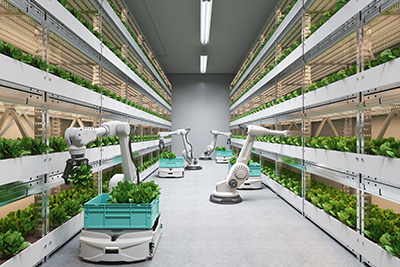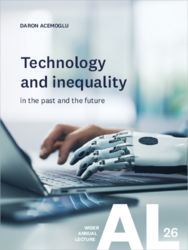WIDER Annual Lecture 26
Technology and inequality in the past and the future
The 2022 Annual Lecture was delivered by Daron Acemoğlu. His lecture challenged techno-optimism, which maintains that technological advances will ultimately benefit society at large, and discussed what the path of digital technologies and artificial intelligence imply for the future.
 Artificial Intelligence (AI) will not make human workers redundant in the near future, but the technology has already made enormous advances. Its proponents, and now even some previously skeptical experts, believe that it will revolutionize white-collar work, medicine, entertainment, transportation, and even scientific research. It can enable many new products and tools, and vastly increase the amount of information that governments and companies have about individuals (Brynjolfsson and McAfee 2014).
Artificial Intelligence (AI) will not make human workers redundant in the near future, but the technology has already made enormous advances. Its proponents, and now even some previously skeptical experts, believe that it will revolutionize white-collar work, medicine, entertainment, transportation, and even scientific research. It can enable many new products and tools, and vastly increase the amount of information that governments and companies have about individuals (Brynjolfsson and McAfee 2014).
And yet, there are many reasons to be concerned. Digital technologies and AI, thus far, have boosted inequality and destroyed good jobs for workers from diverse skill sets (Acemoglu and Johnson 2023; Acemoglu and Restrepo 2022). AI applications have changed how we communicate, with clearly dangerous consequences, such as the manipulation of social media for the proliferation of misinformation, and magnified the ability of governments and companies to engage in surveillance.
All the same, AI is not the first technology with the potential to be transformative and at the same time increase inequality. If we learn from the past, we can shape the future of AI through a better understanding of how and why we have been successful in generating shared prosperity from other major technological breakthroughs.

In doing this, we have to bear in mind that the direction of AI development is not preordained. It can be altered to increase human productivity, create jobs and shared prosperity, and protect and bolster democratic freedoms. This process of redirection must start with a deeper understanding of why recent digital technologies have increased inequality and further empowered rich and already-powerful actors. We must then assess why AI is continuing this trend. The contrast to post-war history is telling in this respect.
 Join the network
Join the network